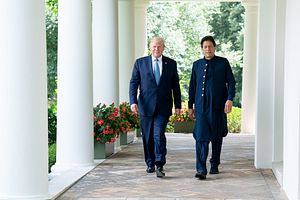The Indian government’s decision to revoke the special status of Kashmir has changed the entire debate surrounding the disputed region. While no one is certain about the implications of the development, the timing of New Delhi’s decision is significant. Did India decide on the issue based on an existing timeline or did something change considerably over the past few weeks that lead to the scrapping of Article 370/35A?
One of the major events that could have impacted India’s plan concerning the abolishment of Article 370/35A is Pakistani Prime Minister Imran Khan’s recent visit to the United States. During Khan’s recent meeting with U.S. President Donald Trump, the conversation between the two leaders inadvertently became focused on the issue of Kashmir. Trump, in his remarks not only offered to mediate between India and Pakistan to resolve the longstanding Kashmir dispute, but also alluded to a request from Modi in this regard.
The statement created a major crisis for Prime Minister Narendra Modi’s government domestically. One of the Bharatiya Janata Party (BJP)’s core electoral promises has remained focused on giving Kashmir the status of a union territory, thereby, integrating the state completely into India. While India denied that any such conversation had taken place between Modi and Trump, a number of stakeholders invested in the conflict got a lot of mileage out of Trump’s account.
Islamabad, in this regard, was the primary beneficiary. Pakistan’s civil-military leadership saw the statement from Trump as evidence of U.S. willingness to assist Pakistan’s narrative on the issue of Kashmir. One can argue that following Trump’s remarks that the situation in Pakistan was blown out of proportion that a tactical statement was presented as a strategic position of the United States. The situation in Pakistan created significant pressures for Modi that anything less than what was already done in the valley wouldn’t have served the party’s domestic political purpose.
However, it would be unwise to argue that there was not any plan in India before Trump-Khan meeting when it comes to removing Kashmir’s special status. Certainly, the plan and how it was to be implemented, did exist. The timing, however, to implement it was one of the key missing links. Interesting, the timing was created by President Trump’s remarks which were celebrated as a huge win by Islamabad and condemned by India and BJP’s support base.
While it remains unclear when the actual implementation of the abrogation of Kashmir’s special status was to take place, in any case, the plan would have to be implanted within the next few weeks. A lot is happening in the region which doesn’t serve India’s political and security interests. Particularly, India views the withdrawal of the U.S. troops from Afghanistan and the likely return of the Afghan Taliban to power as a security threat. The possibility of the Taliban’s return to power in Afghanistan is something which India despises and has worked against for more than two decades. Clearly, India is worried about the deteriorating security situation in Kashmir. In this regard, the impact of the unfolding situation in Afghanistan adds to New Delhi’s distresses and may have added to India’s decision making process concerning the situation in Kashmir.
For Pakistan, India’s decision to abrogate Articles 370/35A has created a serious dilemma. With the stroke of a pen, New Delhi has virtually changed the status of the Line of Control (LoC). From India’s perspective, there is not anything left between Pakistan and India to discuss when it comes to the issue of Kashmir. Arguably, by integrating Kashmir, India has unilaterally declared the LoC an international border. Moreover, any debate regarding the third party intervention has been rendered null and void as New Delhi doesn’t consider consider the territory disputed anymore. Furthermore, India’s decision has also turned the Simla Agreement between India and Pakistan ineffective. According to the agreement, Pakistan and India were to decide the issue of Kashmir bilaterally and any unilateral decision in this regard wouldn’t be acceptable.
From here onward, there is no easy option for Pakistan. Should Islamabad rely on diplomacy to increase pressure on India or should the country follow other means to build pressure on New Delhi? Diplomacy is not going to bring about the desired results which aim to reverse India’s recent decision. On the other hand, Islamabad cannot afford to let radical voices to take charge of the situation as the country remains under strict scrutiny at various international forums such as the Financial Action Task Force (FATF).
However, this doesn’t mean that the situation is going to remain calm in Pakistan. While President Trump’s statement may have added to India’s decision, the timing couldn’t have been worse for Washington. India’s decision to declare J&K a union territory when the Afghan peace process is finally making progress, is not something which the United States would have wanted. Islamabad should be expected to ensure that the U.S. feels the pressure of India’s decision in Afghanistan.
While it’s unclear what will be the long-term implications of India’s decision, the development is would certainly fuel violence in the region.

































